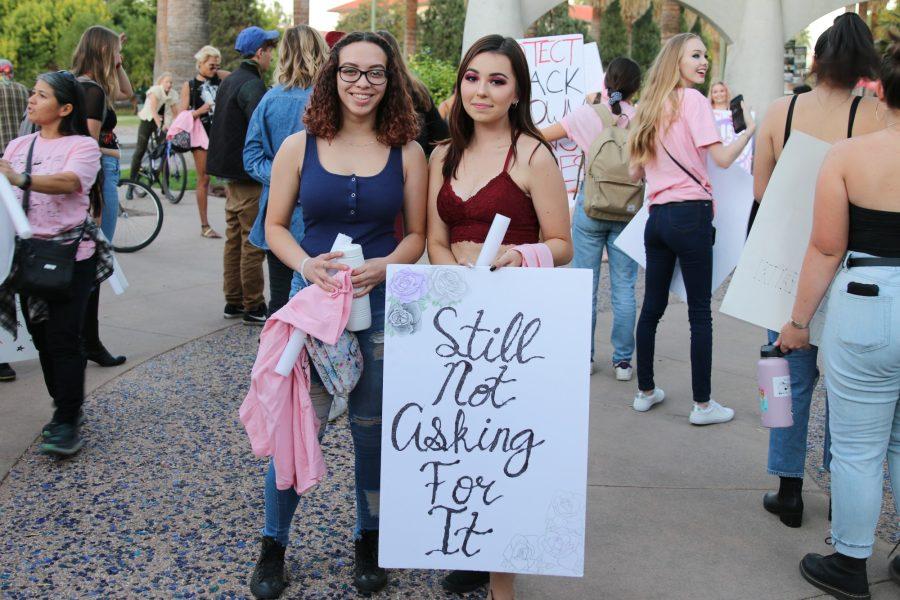The participants in the 2019 SlutWalk sought to reclaim the word “slut” through community action, colorful posters and powerful chants that centered around the idea that women should be free to choose their clothing without fear of shaming or sexual assault.
The annual event, held this year on Nov. 13, began at the Women’s Plaza of Honor at the University of Arizona with sign-making and fiery rhetoric to inspire attendees before they marched to Rialto Theatre in Downtown Tucson. Posters included statements like “my body, my choice” and “stop killing black transgender women.”
Kelsey Valdez is the co-director of Feminists Organized to Resist, Create, and Empower, or FORCE, the group that organized SlutWalk at UA.
“There are so many messages, but we are really trying to center women of color, trans women of color, any really marginalized folks, and really just combating rape culture,” Valdez said.
This year, SlutWalk focused on marginalized women, explicitly addressing the fact that transgender women of color are sexually assaulted more often than other populations of women.
SlutWalk organizers began the rally by encouraging the most marginalized women, particularly “black and brown femmes,” to stand at the front of the procession. Organizers emphasized that this SlutWalk was a tribute to them and that the marginalized deserve to be heard.
Individuals from all over and of all ages came to participate in the 2019 SlutWalk. Aleah Cole, a Coastal Carolina University student, was one of the many supporters who attended the event. Cole communicated her frustration with sexist high school and middle school dress codes as one of her motivations for participating.
“When I was in middle school, I got dress-coded by the principal and she made me sit in her office and wait for my mom to bring me new clothes because I was ‘asking for attention’ because I was wearing leggings with a long shirt. I was 11,” Cole said. “Like how was I asking for attention?”
Brianna Schmidt is a student at Pima Community College who decided to attend SlutWalk. She explained that her teenage sister faces harassment at school, as so many young women do. Schmidt said it is even harder for her to see her family treated so poorly than for her to experience the harassment herself.
Schmidt also stressed the importance of curbing the objectification of women, a message which she believes is encapsulated by SlutWalk.
“It’s so degrading to be constantly told that your body matters more than your mind, that your body matters more than your education,” Schmidt said.
ASUA Administrative Vice President Kate Rosenstengel also marched in the rally. She attended the SlutWalk her freshman year and said that the event has grown “exponentially.”
“I think it’s really empowering for women to be able to take back the word slut, which is so often used against women in a derogatory way,” Rosenstengel said. “It’s all just a really positive spin on combatting rape culture and sexual assault.”
The SlutWalk protesters marched down University Boulevard toward the Rialto Theatre, sporting confidence and feminist pride. They chanted “however we dress and wherever we go, yes means yes and no means no,” and “my body, my choice.”
RELATED: The Women’s March returns to Tucson with hundreds gathering in solidarity
When the protesters arrived at Rialto Theatre, several people spoke about sexual violence, the importance of consent, body shaming and victim-blaming.
“This event means everything to me. So much time and effort have gone into making this experience very memorable for everyone involved,” Valdez said. Individual interpretations of the SlutWalk and how it impacts people’s lives vary, but the common thread is the gravity of the movement for everyone involved.
Follow the Daily Wildcat on Twitter
Copy Notes:
- Kelsey Valdez, Co-director of FORCE, SlutWalk Organizer, she/her/hers.
- Aleah Cole, Coastal Carolina University, SlutWalk Attendee, she/her/hers.
- Brianna Schmidt, Pima Community College, SlutWalk Attendee, she/her/hers.
- Kate Rosenstengel, ASUA Administrative Vice President, SlutWalk Attendee, she/her/hers.








